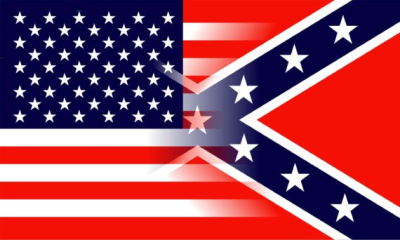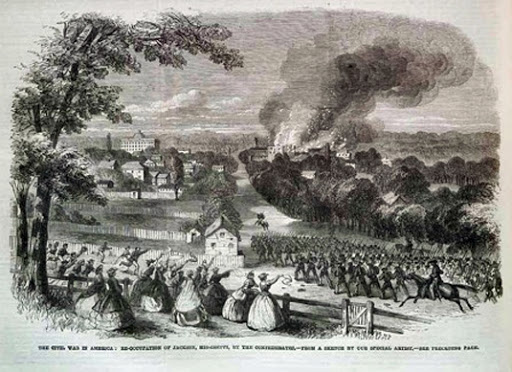About Publications Library Archives
heritagepost.org

Preserving Revolutionary & Civil War History

Preserving Revolutionary & Civil War History

In December 1862, General Sherman left Memphis with 32,000 men on steamboats intending to bring his now perfected doctrine of Total War to Mississippi. To intensify the destructive impact of his forces, Sherman issued General Order No.7, which allowed that any boats shot at from the riverside could stop and burn the nearest houses and farms.
Union troops routinely raided the surrounding areas for all wood found in houses, fences, and barns to be used for fuel.
In the Spring of 1863, Sherman ordered Gen.Frank P. Blair to “strip the Yazoo Valley” and in carrying out the order Blair burned a ½ million bushels of corn and stole 1000 head of cattle along with 300 horses and mules. Even though there was little Confederate resistance to the Union forces in the Valley, Union troops carried out “retaliations” against the civilian population by destroying every grist mill in the area.
This specifically violated Paragraph 22 of the Lieber Code, which distinguishes between “the private individual belonging to a hostile country and the hostile country itself, with its men in arms” along with the already tattered Fourth and Fifth Amendment to the Constitution… the very law of the land that the Federal Forces were fighting to prevent the South from leaving.
Prior to the War, Vicksburg was a vibrant town and a commercial hub with a population of 4200. During the long battle for control of the town, Grant subjected the civilian population, whose place in the Union the Federal forces were ostensibly fighting to preserve, to incessant bombardment. Grant turned the town into a battlefield where civilians were indiscriminately starved into submission. After eating all the horses and mules, the starving population turned to eating rats.
The bombardment of Vicksburg again violated the Lieber Code, which protects civilians, “especially women and children” from bombardment. Paragraph 25 of the code protects civilians from the type of “privation” Grant’s forces subjected it to.

Destruction of Jackson, MS
With Vicksburg subdued, Grant ordered Sherman east to take the state capital of Jackson. On July 16, the Confederate Army evacuated the city allowing for Sherman to take the city without resistance.
Instead, during a 3 day rampage, Union soldiers destroyed the town while Sherman gave his officers a banquet in the governor’s mansion. A Northern journalist reported that:
“They left the entire business district section in ruins, burned most of the better residences, dragged furniture into the street to be demolished and looted homes, churches and the state library….in summing up his impression of the sack of the town, he stated that such complete ruin and devastation never followed the footsteps of any army before” (Waters, page 468)
Once again, this violated the Lieber Code. Paragraph 38 states that “private property, unless forfeited by crimes or by offences of the owner, can be seized only by military necessity, for the support or other benefit of the Army of the United States.”
Obviously, the burning of private businesses, homes and churches has nothing to do with military necessity but rather with retribution and the expression of pent-up rage… which, of course, can always be excused as a “military necessity” which, by terrorizing the population, demoralizes its will to fight and thus aids the war effort.
In early 1864, Sherman moved his troops from Chattanooga (where they had imposed a brutal occupation on civilians) back to Vicksburg and moved east. Although it was an important supply center and railroad hub, the weakening Confederate forces withdrew from Meridian Mississippi.
Sherman occupied the city without a fight on Feb 14 and then had his troops spend 5 days unofficially destroying the town.
In his report, Sherman noted:
“For 5 days 10,000 men worked hard and with a will in that work of destruction, with axes, claw bars, and with fire, and I have no hesitation in pronouncing the work as well done. Meridian with its depots, store-houses, arsenal, hospitals, offices, hotels and cantonments no longer exists.” (Walters Page 471)
The Lieber Code paragraph 34 specifically exempts hospitals and churches from military use let alone destruction; Grant is as guilty as Sherman in this account since he did nothing to halt or punish Sherman when he gleefully reported such destruction to him.
During this period, many civilian private properties – farms, homes, livestock, villages, and towns were subjected to systematic pillage by federal forces, all of it in violation of the Lieber Code which, under paragraph 43, states “all robbery, all pillage or sacking… are prohibited under penalty of death, or such other severe punishment as may seem adequate for the gravity of the offense.” (Walters page 472)
Of course, given the fact that Sherman could always fall back on the need to satisfy “military necessity” where everything that was “prohibited’ was actually “permissible” under the ultimately empty strictures of the Lieber Code.
Since Federal supply lines were under constant attack in Tennessee, it is likely that both regular Confederate troops, as well as civilians, were involved. Gen. Eleazer A. Paine decided that retaliation would provide information as to the attacker’s location. His forces marched into Fayetteville, seized hostages, dragged them to the town square, and announced he would execute four of the hostages unless someone came forward with information regarding the location of those who had been carrying out the attacks.
One was released; three others were shot. Murder of civilians is, of course, expressly forbidden by the Lieber Code paragraph 44. Paragraph 148 forbids the proclamation of infamy on civilians and states: “The sternest retaliation should follow the murder committed in consequence of such proclamation, made by whatever authority.”
However, Paine was not punished either for this incident or for the many allegations of a similar nature made against him; he was reputed to have hanged so many uniformed Confederate prisoners that he earned the nickname ‘The Hanging General.” (Michael R. Bradley “With Blood and Fire” 2003, Pages 78-80)
The most heinous mass-casualty crime committed by the Federal forces occurred in Roswell Georgia in 1864, where approximately 500 hundred women and their children were grossly maltreated.
After burning several cotton mills, Union Gen. Kenner Garrard notified Gen. Sherman that he had several hundred civilian women and children who had worked there under his control. Sherman ordered the arrest of the owners of the mills, have them charged with treason and then have them hanged without trial should “the impulse of anger” overcome Gen. Garrard. Sherman also ordered that the women and children be sent on a 10 mile forced march to Marrietta Ga.
He wrote Garrard:
“I repeat my orders that you arrest all the people, male and female, connected with those factories, no matter what the clamor, and let them foot it, under guard, to Marrietta, whence I will send them by (railroad) cars to the North… the poor women will make a howl. Let them take along their children and clothing, providing they have the means of hauling or you can spare them.” (Official Records, series 1, vol. 38 pages 39, pages76 – 77)